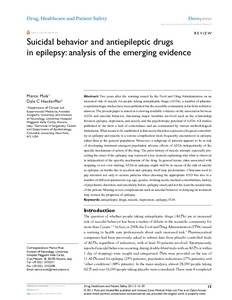Mula, M; Hesdorffer, DC
(2011)
Suicidal behavior and antiepileptic drugs in epilepsy: analysis of the emerging evidence.
Drug, Healthcare and Patient Safety, 3.
pp. 15-20.
ISSN 1179-1365
https://doi.org/10.2147/DHPS.S13070
SGUL Authors: Mula, Marco
![[img]](https://openaccess.sgul.ac.uk/107332/1.hassmallThumbnailVersion/Suicidal_behavior_antiepileptic_drugs_epilepsy_analysis_emerging_evidence.pdf)  Preview |
|
["document_typename_application/pdf; charset=binary" not defined]
Published Version
Download (132kB)
| Preview
|
Abstract
Two years after the warning issued by the Food and Drug Administration on an increased risk of suicide for people taking antiepileptic drugs (AEDs), a number of pharmacoepidemiologic studies have been published but the scientific community is far from definitive answers. The present paper is aimed at reviewing available evidence on the association between AEDs and suicidal behavior, discussing major variables involved such as the relationship between epilepsy, depression, and suicide and the psychotropic potential of AEDs. All studies published so far show a lack of concordance and are constrained by various methodological limitations. What seems to be established is that mood disorders represent a frequent comorbidity in epilepsy and suicide is a serious complication more frequently encountered in epilepsy rather than in the general population. Moreover, a subgroup of patients appears to be at risk of developing treatment-emergent psychiatric adverse effects of AEDs independently of the specific mechanism of action of the drug. The prior history of suicide attempt, especially preceding the onset of the epilepsy, may represent a key element explaining why what is observed is independent of the specific mechanism of the drug. In general terms, risks associated with stopping, or not even starting, AEDs in epilepsy might well be in excess of the risk of suicide in epilepsy, as deaths due to accident and epilepsy itself may predominate. Clinicians need to pay attention not only to seizure patterns when choosing the appropriate AED but also to a number of different parameters (eg, age, gender, working needs, medical comorbidities, history of psychiatric disorders, and suicidality before epilepsy onset) and not the least the mental state of the patient. Missing severe complications such as suicidal behavior or delaying its treatment may worsen the prognosis of epilepsy.
Statistics
Item downloaded times since 18 Mar 2015.
Actions (login required)
 |
Edit Item |



